https://www.girlsgonestrong.com/
The weeks and months after baby are some of the most intense of the human experience. Sleep deprivation, sky high emotions ranging from sheer terror to sheer joy, and the surreal experience of trying to make your peace with a totally new body.
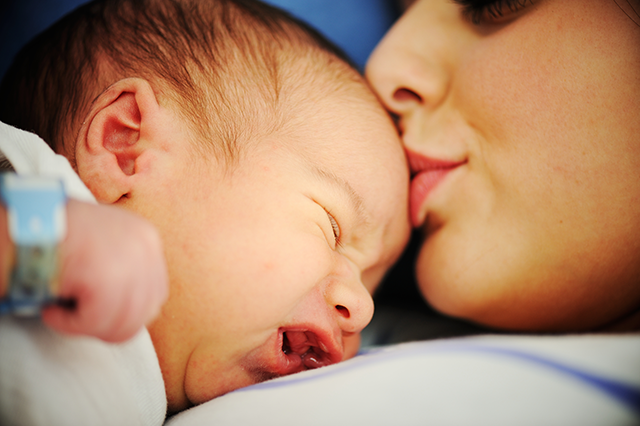
Of course, there’s an expected transition time of healing, snuggling your newborn and being in awe of what your body just did (talk about a workout!), but then there’s the pressure of getting back to your “pre-baby body”.
Ugh, can I tell you how much I hate that idea?
Unless you’re a time traveler, you aren’t going backwards to your pre-baby anything. You’ve got a new set of physical limitations, new hormonal profile, and a new set of priorities.
The problem with thinking you’re going back to your pre-baby body is that it leads us to forget things are different. Your pre-baby body was a different body – hormonally and physically.
What you used to do to drop 10 pounds likely won’t work as well – even if you can find the time to do it!
We aren’t talking about never being lean again or never dropping the baby weight, or about accepting a weight or shape that you’re not happy about.
We’re talking about the importance of going about getting those things in a smarter way so that you can not only be successful, but also be sane.
Simply put, the truth is that what worked for you before may just not work now. What happens for many women, particularly breastfeeding moms, is that no one has told them how their metabolism has changed from these significant hormonal shifts and why their old way may not be the best way.
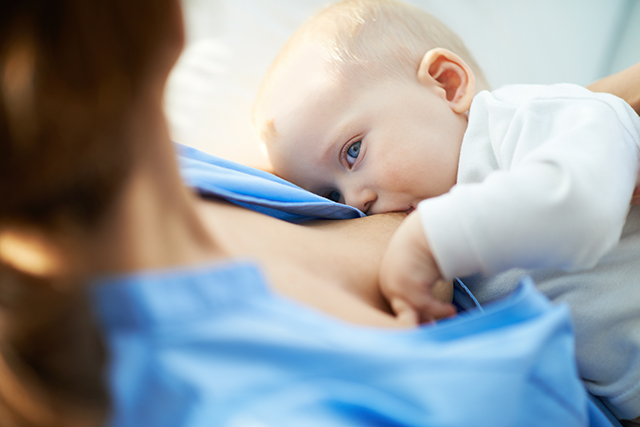
Pregnancy is a time of high estrogen and high progesterone, after delivery both of those hormones will plummet as your body adjusts to the new norm. With breastfeeding, a hormone called prolactin is high which keeps estrogen lower – making fat loss a tough game to win.
Your new hormonal profile is more like one of a menopausal woman than your previously youthful self.
While estrogen dominance gets a bad rap for making us fat, the truth is we need enough estrogen to keep a lean and tight body (think less body fat, more muscle mass).
Without it we have a less forgiving metabolism largely due to lack of temperance of insulin and cortisol – the combo of high insulin and high cortisol is a recipe for fat storage, particularly at the belly.
In addition to low estrogen, if we aren’t ovulating (and many breastfeeding mothers aren’t), we also aren’t making much progesterone. Progesterone plays a role in hindering belly fat storage by moderating cortisol’s effect in these fat cells.
Take this low estrogen/low progesterone state and we see much more sensitivity to carbohydrates and a much harder time dropping belly fat, and fat in general. Couple that with the lack of sleep, and the mummy tummy that so many women feel upset about can be very tough to lose.
And the hormonal haywire doesn’t stop there.
Pregnancy is a time of high cortisol, as is the newborn phase. You’re running on empty from the middle of the night feedings and often highly stressful time of having a newborn. Enter ingredient #1 for belly fat (cortisol).
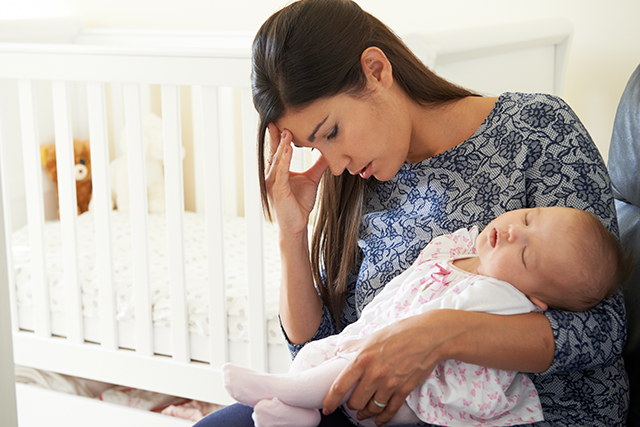
Plus, when we’re exhausted from being up all night, our cravings for carbs and sweets are usually off the chart. If we indulge them, then we’ve added ingredient #2 for belly fat: high insulin.
This scenario is the perfect storm for difficult fat loss and easy fat gain. Just what a new mom needs, right?
All hope is not lost though, here’s what you can do during this time to get some results:
Before you even think about working out, address your core and pelvic floor.
What your body has been through is no joke and you need some physical therapy. It is normal to want to get back into fat burning exercise as soon as you can, but if you neglect this much-needed rehab, you’ll end up injured, frustrated, and maybe even peeing your pants during a squat.
In this article, fellow GGS Advisory Board Member Jessie Mundell discusses three exercises that help you regain optimal function after baby.
Also, addressing your core and floor will help you get a smaller waist again.
During pregnancy your abs were stretched, your ribs began to flare out to the sides as your growing baby pressed up under your ribcage, and your pelvis likely tipped forward as your low back tried to deal with the big baby belly.
All of this postural mess will make your waist look wider.
Your time is limited, so you have to work out smarter.
Walking with baby napping in stroller, short metabolic circuits at home or your gym for optimal hormonal balancing fat loss. Skip the longer duration cardio and too much intense exercise.
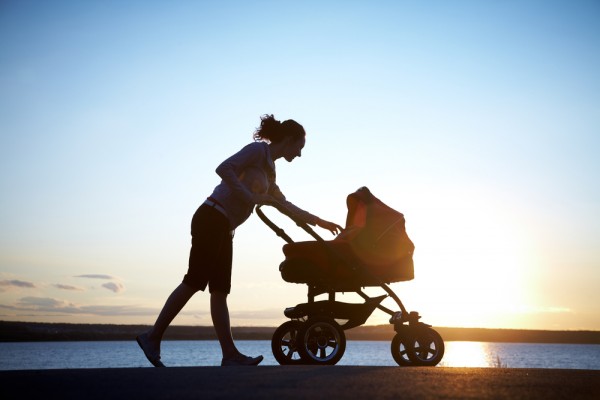
A walk with baby can be the perfect prescription for physical and mental health.
Low estrogen makes the long duration stuff less effective and the high cortisol can make the intense stuff back fire.
*Don’t focus on cutting calories or on eating less, your main job really is to nurture your baby – let’s not lose sight of that as we vie for more weight loss. Instead focus on more support foods: vegetables and lean proteins; as well as more activity. Move as much as you can.
Do 10-20 body weight squats several times per day i.e. while you’re waiting for your tea water to boil, as baby sits there cooing at you, anytime you have 1 minute do a set of squats with a pelvic floor lift.
Dance with your baby. Walk as much as possible instead of driving or park further away (10,000 steps a day is a great goal). Jaunt up and down your staircase quickly and frequently. Play at the park.
Live the Dr. Brooke mommy mantra of, “Do as much as you can, as often as you can.”
Find ways to make it work.
Life for a woman with a new baby is anything but predictable – babies seem to have little regard for our workout schedule. While going to the gym offers you the most equipment, I’ve found getting it done at home has increased my consistency 10 fold.
My home gym takes up less than 2 square feet and was a minimal investment. I’ve got 2 kettlebells, one set of Valslides, a TRX, and I make use of the stairwell in my apartment building for some sprints.
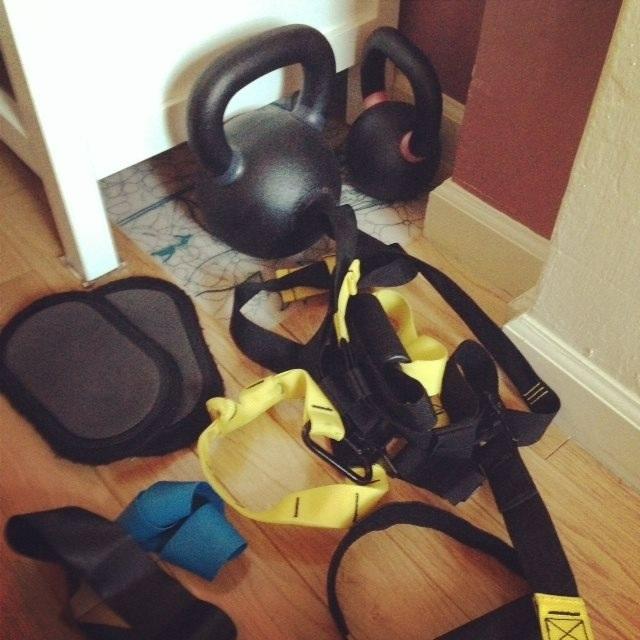
It won’t be perfect, do it anyway.
My home workouts are rarely seamless start to finish, but I’ve learned to finish anyway. Yesterday I had to stop 3 times and put the kettlebell down and pick up the baby. I wanted to stop, feel frustrated, and try again tomorrow.
Instead I just kept going. Sure I had more rest than my circuit called for, but I got it done. That’s the key right now.
Consider a lower carb, higher fat diet.
The lower carb aspect will keep your insulin more managed, while the higher fat intake will keep your calories up and keep you satiated. Overall you’ll likely feel more satisfied and won’t risk dropping calories so low your milk supply drops.
Remember, low carb is all relative. Find your unique carb tolerance here.
Breastfeeding mothers: trust that it will likely get easier…
…after you stop nursing.
I was pleasantly surprised that my fat loss got so much easier literally the week I stopped breastfeeding. This is a time to own your breastfeeding choice. Sure it may be easier if you weren’t breastfeeding, or hadn’t just had a baby, but these were our choices – for better or worse.
Prolactin, the hormone responsible for making milk also promotes fat storage through a variety of mechanisms including worsening insulin resistance (in its own right) and lowering the hormone adiponectin. Adiponectin is a hormone secreted by fat cells that helps regulate insulin sensitivity (less adiponecin means you’ll tolerate carbs less well). While your hormonal profile may make fat loss slow during breastfeeding, keep reminding yourself of the incredible benefits to you and baby that nursing provides.
Read more on that here:
- http://www.sciencedaily.com/releases/2009/04/090402092859.htm
- http://www.ncbi.nlm.nih.gov/pubmed/15882993
AND, skip the guilt!
So many women feel wracked with guilt that they are complaining about feeling chubby while they are also experiencing the joy of a beautiful baby. I’ve fallen prey to this as well, I mean how shallow am I to worry about my waistline when so many women can’t even ovulate well? Here I am with my adorable baby girls, and I’m whining about being fat?
Both can be true: you can want to feel good about your body again and be insanely grateful for your baby. They aren’t mutually exclusive. Keep perspective and use the gratitude you feel for having your little bundle fuel you to make better choices for yourself when it comes to food and exercise.
DO do that hard, hard thing of making time for yourself
If you’re exercising, eating better, and finding a few moments for self-care you will be much better able to care for yourself and your family.
They need you, so you need to be in a good place.
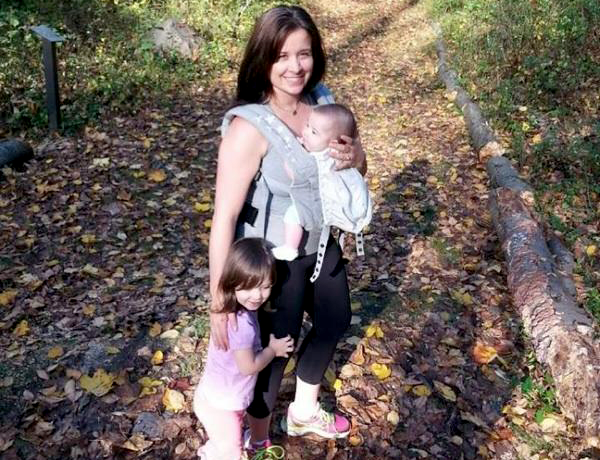
Filed under: Fitness

 For now classes are 6pm and 640pm at 2840 Wildwood st in the Boise Cloggers studio.
Book your class NOW!
click this ==>
For now classes are 6pm and 640pm at 2840 Wildwood st in the Boise Cloggers studio.
Book your class NOW!
click this ==>








